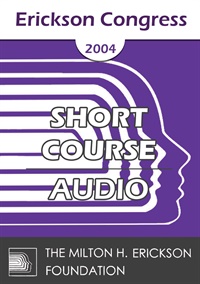
- Average Rating:
- Not yet rated
- Topic Areas:
- Short Courses | Children and Adolescent Therapy | Hypnotherapy | Hypnosis | Hypnotic Induction | Family Therapy
- Categories:
- Erickson Congress | Erickson Congress 2004
- Faculty:
- Antonio Bustillo, PhD
- Duration:
- 1:19:45
- Format:
- Audio Only
- Original Program Date:
- Dec 02, 2004
- Short Description:
- By tapping in on the child's natural tendency for curiosity and mastery, and utilizing the natural everyday hypnotic communication patterns within the family, it is possible to create a therapeutic "hypnotic space" within the family. The use of brief hypnotherapy from a family therapy frame can help the child/adolescent disengage from the individualistic problematic view, increasing the possibility for more lasting generative changes. Special attention will be given to the role of parents as active participants in this therapeutic process.
- Price:
- $15.00 - Base Price

- Average Rating:
- Not yet rated
- Topic Areas:
- Short Courses | Ericksonian Hypnosis and Therapy Techniques | Hypnotherapy | Hypnosis | Social Issues
- Categories:
- Erickson Congress | Erickson Congress 2004
- Faculty:
- Halim Faisal, MSW | Diane Holliman, PhD
- Duration:
- 1:19:41
- Format:
- Audio Only
- Original Program Date:
- Dec 02, 2004
- Short Description:
- Hypnotherapy has been an under-used tool in social work. However, the principles of Ericksonian hypnotherapy are quite congruent with social work especially in serving at risk populations. Examples of how to use Ericksonian hypnotherapy and evaluate outcomes with at risk populations will be presented.
- Price:
- $15.00 - Base Price

- Average Rating:
- Not yet rated
- Topic Areas:
- Short Courses | Hypnosis | Solution Oriented Approach | Treatment Planning
- Categories:
- Erickson Congress | Erickson Congress 2004
- Faculty:
- Joel Marcus, PsyD | Marc Oster, PsyD
- Duration:
- 1:19:45
- Format:
- Audio Only
- Original Program Date:
- Dec 02, 2004
- Short Description:
- Appropriate hypnotic treatment planning can facilitate the process of moving through crisis into subsequent stages of health. Physiological issues of pain and discomfort can contribute greatly in the psychological distress in patients. Participants will learn the fundamentals of solution-focused treatment planning for health-challenged populations.
- Price:
- $15.00 - Base Price
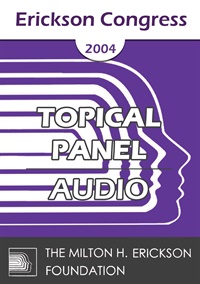
- Average Rating:
- Not yet rated
- Topic Areas:
- Topical Panels | Hypnosis | Mind-Body
- Categories:
- Erickson Congress | Erickson Congress 2004
- Faculty:
- Sidney Rosen, MD | Carol Kershaw, EdD | Ernest Rossi, PhD | Bernhard Trenkle, Dipl. Psych
- Duration:
- 59:28
- Format:
- Audio Only
- Original Program Date:
- Dec 03, 2004
- Short Description:
- IC04 Topical Panel 07 - Mind/Body/Medical Hypnosis - Carol Kershaw, Ed.D,. Sidney Rosen, M.D., Ernest Rossi, Ph.D., Bernhard Trenkle, Dipl. Psych.
- Price:
- $15.00 - Base Price

- Average Rating:
- Not yet rated
- Topic Areas:
- Topical Panels | Hypnosis | Language of Hypnosis
- Categories:
- Erickson Congress | Erickson Congress 2004
- Faculty:
- Douglas Flemons, PhD | Brian Grodner, PhD | Annellen M. Simpkins, PhD | Alexander Simpkins, PhD
- Duration:
- 1:01:30
- Format:
- Audio Only
- Original Program Date:
- Dec 03, 2004
- Short Description:
- IC04 Topical Panel 08 - Hypnotic Language - Doug Flemons, Ph.D., Brian Grodner, Ph.D., Annellen Simpkins, Ph.D., Alexander Simpkins, Ph.D.
- Price:
- $15.00 - Base Price
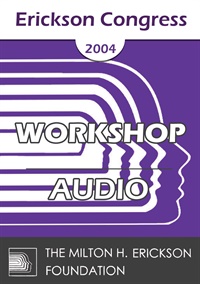
- Average Rating:
- Not yet rated
- Topic Areas:
- Workshops | Consciousness | Hypnosis | Meditation, Spirituality and Yoga
- Categories:
- Erickson Congress | Erickson Congress 2004
- Faculty:
- Ronald Havens, PhD
- Duration:
- 1:32:20
- Format:
- Audio Only
- Original Program Date:
- Dec 02, 2004
- Short Description:
- This workshop explores the use of hypnosis to create mystical or transcendental states of consciousness. As Maslow noted many years ago, even a brief or faint taste of such experiences seems to change people in dramatically positive ways. One momentary immersion can change a person's psychological and emotional condition forever, perhaps even altering basic hormonal, neurological and biochemical states.
- Price:
- $15.00 - Base Price
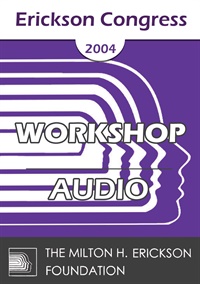
- Average Rating:
- Not yet rated
- Topic Areas:
- Workshops | Hypnosis | Ericksonian Hypnosis and Therapy Techniques
- Categories:
- Erickson Congress | Erickson Congress 2004
- Faculty:
- Stanislav Kratochvil, PhD
- Duration:
- 1:56:15
- Format:
- Audio Only
- Original Program Date:
- Dec 02, 2004
- Short Description:
- Traditional hypnosis is defined as a state of 1) heightened suggestibility, 2) changed relationship with the hypnotist, and 3) altered state of awareness. Hypnotic susceptibility is supposed to be a personality trait. The traditional approach will be demonstrated and its contribution for understanding hypnosis will be discussed and compared to the Ericksonian one.
- Price:
- $15.00 - Base Price
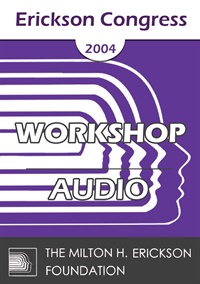
- Average Rating:
- Not yet rated
- Topic Areas:
- Workshops | Hypnosis | Law & Ethics
- Categories:
- Erickson Congress | Erickson Congress 2004
- Faculty:
- Alan Scheflin, JD
- Duration:
- 2:04:06
- Format:
- Audio Only
- Original Program Date:
- Dec 02, 2004
- Short Description:
- More than 1,000 judicial cases have discussed the relationship between hypnosis and the law. In order to protect the rights of patients, and to assist clinicians in providing competent and ethical therapy utilizing hypnosis, an understanding of the legal rules and professional guidelines for conducting clinical and hypnosis sessions will be presented.
- Price:
- $15.00 - Base Price
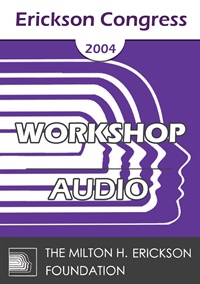
- Average Rating:
- Not yet rated
- Topic Areas:
- Workshops | Hypnosis | Obsessive Compulsive Disorder (OCD)
- Categories:
- Erickson Congress | Erickson Congress 2004
- Faculty:
- Krzysztof Klajs, Dipl. Psych
- Duration:
- 1:55:56
- Format:
- Audio Only
- Original Program Date:
- Dec 02, 2004
- Short Description:
- A number of useful strategies for working with OCD will be presented in this session, including the combination of hypnosis with cognitive-behavioral strategies in reaction prevention and implosive approaches. Klajs will stress systemic ideas for increasing the effectiveness of therapy. Time will be allowed for participants to discuss the emotional reactions typically experienced while working with OCD patients.
- Price:
- $15.00 - Base Price
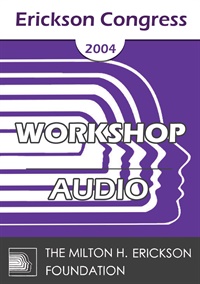
- Average Rating:
- Not yet rated
- Topic Areas:
- Workshops | Hypnosis | Neurobiology | Pain and Healing | Affect
- Categories:
- Erickson Congress | Erickson Congress 2004
- Faculty:
- Jeffrey Feldman, PhD
- Duration:
- 2:03:01
- Format:
- Audio Only
- Original Program Date:
- Dec 02, 2004
- Short Description:
- This workshop will review the neurobiology of pain processing, affect and hypnosis. Neuro- imaging studies will be reviewed elucidating individual differences in pain sensitivity and identifying distinct areas of the brain differentially activated depending upon the nature of hypnotic suggestions. A hypnotic approach that develops a dissociation between sensory and affective components of pain through the accessing of prior positive emotional experience will be demonstrated.
- Price:
- $15.00 - Base Price
Please wait ...

